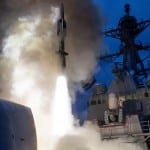
Boeing [BA] and Saab AB are teaming on another project, this one a ground-based delivery system for Boeing’s Small Diameter Bomb (SDB), and the two companies say they’ve already successfully tested the weapon three times with potential customers present.The weapon, called the Ground Launched Small Diameter Bomb (GLSDB), is comprised of a SDB munition, an interstage adaptor and a M26 rocket motor from the Multiple Launch Rocket System (MLRS). The weapon, launched from an existing MLRS launcher, has a range…












